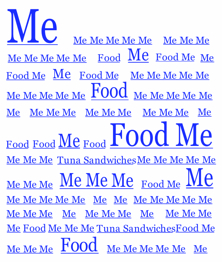
Or, let’s play: Spot The Hypocrism.
Validation is one of those things that people require and demand from others, and which they often never think of offering to others.
Spot the hypocrism.
This is a bunch of further thoughts I had after writing this post
This was going to be a bit of a rant, but I just couldn’t summon up enough energy to have a proper rantfest about this issue. At another time I might have had a bit of a jump around breaking things over this, but at the moment it only saddens me. This is partly because:
- I’ve been suffering without a really exceptionally yummy biscuit for longer than I care to admit
- I’m depressed by finding yet more evidence (as if anybody needed it) of the epic legion of unknowingly damaged psyches all over the place
- I’m further depressed by watching all those damaged psyches obliviously committing hypocrisms hither and yon, whilst all the time they’re tripping merrily along singing tra la – the thingy-oh
- I still endure the deprivation of such quality biscuitness as no sensualist should be without (the importance of this cannot be over stressed)
- And if this weren’t bad enough, I am extra bonus depressed by
- watching all the damaged, hypocrismical, singing psyches blithely abandoning what I call “ordinary vanilla manners” (if they ever had any in the first place)
- and using the feeblest of excuses for doing so (my dog ate them)
Essentially, this is a rantfest, minus the fest, and without the chutzpah.
Ok, back (or onward, whatever) to validation.
I do not regard validation as something necessary or unique to BDSM and its participants. I regard validation as an example of respectful manners which, whilst it is frequently missing from “vanilla” interactions, it is even more frequently missing from BDSM interactions, as well as from many other non-mainstream diverse groups.
In short, this is about (and for) those people who bitch about not being validated by others, when those same people are unprepared (or more likely unable) to offer validation to others.
- (there’s that hypocrism I was mentioning, didja spot it?)
Defining Validation
I searched the web, I searched Wikipedia, and I searched Wiktionary. I looked in my bedside table, behind the cushions of the sofa, and under the bed. Admittedly, my search was rather cursory, although I did maintain an awareness that one often finds things in the last place one looks.
So I also checked behind the fridge and under that big pile of stuff I’ve had in the corner for awhile. And then I checked teh intarwebz again. Considering the importance and scope of this topic in human interactions, I found incredibly few articles addressing this subject. Most of them were about technical validation in a wide variety of IT related topics.
This closest relevant resource I found, was this Wikipedia disambiguation page, which has buried within it (with no onward relevant link to any page with further detail about it) this definition:
- “In psychology and human communication, validation is the reciprocated communication of respect which communicates that the other’s opinions are acknowledged, respected, heard, and (regardless whether or not the listener actually agrees with the content), they are being treated with genuine respect as a legitimate expression of their feelings, rather than marginalized or dismissed.”
I think this is a rather convoluted, vague, and incomplete definition. Wikipedia usually does so much better.
I would rephrase it thusly:
- Validation: A communicative behaviour, in which one human being recognises, acknowledges, and affirms the value, importance, and legitimacy of a second human being’s opinions, feelings, efforts, and/or contributions, and that recognition, acknowledgment, and affirmation is made directly to that second human being.
It was very disappointing to have to create an entire whole definition all by myself when there is a whole internet’s worth of neurotics out there, many of whom are likely to have extremely good biscuit suppliers.
But I guess nobody else noticed that validation is that important.
Oh well.
Failure To Recognise Ideas
One lesson I have learnt and had reinforced over and over again by repeated observation, is that it is difficult if not impossible for human beings to conceptualise an idea, if the person does not have a name or a term assigned to that idea.
I mean, you can’t call a puppy and expect him to respond to his name if he doesn’t have one.
I have also observed again and again that many people may be perfectly aware of word meanings, especially in the way those word meanings apply to other people, whilst at the same time remaining completely oblivious to how those word meanings apply in practice to their own behaviour.
Like, the puppy can associate a name with the person speaking it, but might never learn that the name applies to him.
- (sometimes it might just appear as though puppies are smarter than people)
And further to that, there are a lot of terms which are really very general and vague and not very helpful when used by themselves, because without specifics, they really don’t convey much meaning. Most people feel comfortable with many of those terms and assume that they know what they mean, and for some reason never wake up to the fact that they haven’t a clue about what those words mean in terms of their actual behaviour.
Common examples of this are terms such as:
- validation
- communication
- respect
- negotiation
- support
- open-minded
- tolerance
- inclusive
and so on.
For example, most people seem very aware when their own diversity is excluded by others, but for the most part seem genuinely quite blissfully unaware when they themselves exclude the diversity of others.
You know those times when somebody is denouncing some really nasty behaviour, and it is pointed out to them that they do precisely the same thing as the thing they are denouncing?
And you know what it’s like when they turn to you, and calmly, and totally believing themselves, and absolutely without irony of any kind, they say:
- “”Oh, no, but that’s different.”
Dontcha just hate that?!
- (that would be another example of that depressing [and infuriating] oblivious hypocrism I mentioned earlier)
This kind of selective obliviousness really makes me want to jump up and down and fling noisy breakables at very firm stationary objects.
But it’s sad too, because it doesn’t really help me feel optimistic about the human condition improving at all anytime soon.
Sigh.
Although most people may very well know the meaning of the term “open-minded”, it has been brought to my attention many times that most people are really not aware of what it means, in practice, to actually incorporate open-mindedness towards others into their own behaviour.
My practical experience of most people’s open-mindedness, is that their minds are about as open as a bank at midnight on a Sunday.
I have found that most people’s open-mindedness, no matter what they say to the contrary, is never as open as as they say it is.
- (which is to say, not as open as the door of a fridge in a Jewish home)
Important Stuff To Specify
Just like the difficulty with open-mindedness, I find the same problem with communication. Most people hear the term “communication”, and assume that they know what is meant. Yet there are always things which are unclear until they are explicitly specified:
- Communication by whom?
- Communication to whom?
- Communicated where?
- Communicated how?
- Communication of what content?
- Communication for what reason?
- Communication for achieving what end(s)?
Without knowing the answers to those questions, I think that the term “communication” all by itself is just about meaningless. Yet most people seldom stop to consider that “communication” itself is only the vaguest of terms, which comprises many vital elements within it. For example, “validation”, in my opinion, is just one of the many elements required before “communication” becomes meaningful.
I mean, there is a vast chasm of difference between:
- A meal was cooked.
and
- To thank me for a favour I’d done for her, my friend spent ages at her home preparing and serving me a delectable Italian dinner, which I enjoyed immensely.
Broken down:
To thank me for a favour I’d done for her, [what end]
my friend [by whom]
spent ages (preparing and serving) [how]
at her home [where]
preparing and serving (for) me [to whom]
a delectable Italian dinner [what content]
which I enjoyed immensely [what reason].
It may be of interest to note in this example that the gift of the meal may legitimately be regarded as my friend validating me for doing her the favour, and my enjoyment of the meal (if I express my enjoyment explicitly to her) might legitimately be regarded as me validating my friend for her culinary efforts.
My friend validating me for the favour I did for her is really what I think the “what reason” was all about in the above example. Thanking me was the end goal, and validation was the reason for the thanks.
Or, one might describe my favour for my friend, and my friend validating me for my favour, as:
- A favour for a flavour, and a flavour for a favour.
Heh. Sorry. :)
About Receiving Versus Doing
It seems that most people (if not all) are at least subconsciously aware of the beneficial and positive effects they experience from being validated by others (in the sense outlined above), even if they aren’t aware that “validation” is what’s happening.
I’m sure you’ve all heard somebody bitching vociferously at least once in your life about how everybody is so ungrateful and how they never get appreciated enough for all their hard work and so on and so on and son on.
(yes, it gets old for me too)
If any of the incoming validation which people expect or require is insufficient for their needs or altogether absent (even if they don’t have a term for what they’re bitching about), my experience is that much bitchness will ensue, therein.
Verily.
However, few people seem to be aware of the positive benefits they may achieve in their human interactions by offering validation to others, in the same ways which they require validation from others.
- please note the hypocrism of requiring without offering.
Clearly, a person may easily enjoy a validating experience without having to recognise or identify it. Obviously I might have enjoyed that Italian dinner every bit as much without having to specially recognise that my friend was using the meal to express her validation for the the favour I did for her.
Even if I hadn’t consciously recognised that my friend was “validating” me, my subconscious will have taken note of the validatory content of the exchange and found it profoundly satisfying, even if I hadn’t consciously associated the term “validation” with that experience.
But if a person doesn’t precisely and consciously identify “validation” by name as incoming behaviour which they require and recognise, then I don’t think it’s really possible for a person to assimilate “validation” into their own behaviour to the point where they are able to generate that behaviour for others.
I don’t think the difficult part is knowing what “validation” means. I think the difficult part is observing incoming validation, being able to properly recognise it, and then being able to generate that same behaviour appropriately.
I think everybody knows that listening to and understanding somebody speaking a foreign language is much easier than speaking that foreign language themselves. I believe this is another flavour of the same problem.
So, here is a primer on how to incorporate validation into your own behaviour, and hopefully achieve some positive results. :)
Welcome to Validation 101. Hopefully this will make it clearer how to validate others in ways which you yourself would prefer to be validated. It is my opinion that the more people do this, the more people will be aware of how to do it for others.
Or maybe not.
But anyhow, it’s an effort. You may validate me in the comments if you wish.
(which I’d like a lot :) )
Recognising Validation
1. Your Feelings
Your feelings are vital indicators to you about all kinds of things. Your feelings will tell you unmistakably whether you are genuinely being validated or not. Your feelings and instincts always convey very valuable and important information, even if that information isn’t what you expect.
So please listen to your feelings. If you don’t, then it will not be possible to self-validate, which is the first step in being able to validate others.
- If you can’t validate yourself, then you will not be able to validate others.
Simple ways to do this are to take note of your accomplishments, enjoy the results, and take pride in your efforts.
2. Receiving
In any human interaction, if you feel any of the following:
- Appreciated
- Valued
- Heard
- Seen
- Noticed
- Respected
- Acknowledged
- Recognised
- Affirmed
- Legitimised
- Included
- Thanked
then chances are you have genuinely been validated.
3. Not Receiving
If, on the other hand, in any human interaction, you feel any of the following:
- Unappreciated
- Undervalued
- Unheard
- Invisible
- Disregarded
- Disrespected
- Unacknowledged
- Ignored
- Minimised
- Dismissed
- Excluded
- Unthanked
Then you are very likely to have just been invalidated.
To be fair, it doesn’t take much to invalidate somebody. Simple inaction will do it.
Validating is a bucketload harder than invalidating.
- (which explains why there’s so much invalidating going on and hardly any validating)
Validating Others
1. People Are Not Mind Readers
However much you make use of somebody’s gift, or enjoy their efforts, or agree with their opinions, or however smart or intuitive somebody might be, other people are unlikely to be able to read your mind to determine whatever sentiments you have, unless you tell them in detail using so many words.
- No matter how obvious you think your feelings are to other people, your feelings are unlikely to be obvious to others unless you describe your feelings explicitly to them.
- No matter whether other people have guessed correctly how they think you feel or not, they are unikely to penalise you if you express your appreciation using explicit words.
- No matter whether you think you’ve communicated your appreciation of somebody in vague words or deeds, they are unlikely to penalise you if you repeat your appreciation to them explicitly.
2. Not All Things Are Little Things
Just as you might sometimes feel that a little favour you’ve done for somebody might not have been a big deal for you, but was a big deal to them, sometimes something which may seem like a small favour done for you might have been a large effort for somebody else.
- No matter how insignificant a favour or effort might appear to you, the person who benefitted you will still benefit from you expressing your appreciation explicitly and directly to them.
- No matter how little time a person spent on something to benefit you, explicitly expressing your appreciation to them will probably take less time than they invested for your benefit.
3. Incidental Benefits
Just because another person has already expressed appreciation to an individual for their effort which benefitted both the other person and you, there is nothing stopping you from also expressing your own appreciation for that individual’s effort which has incidentally benefitted you.
- No matter how many other people have already expressed their appreciation, human beings do not generally have a limit on the number of people from whom personal and genuine appreciation can be enjoyed.
- No matter how indirectly something has benefitted you, and how unintentional that benefit was, if you benefitted, then the person who benefitted you deserves and is entitled to your explicitly expressed appreciation, just as you would appreciate, deserve, and be entitled to an expression of appreciation from a person whom you inadvertently benefitted.
4. Validation Is Effective Regardless Of Benefit Received
Just as you would appreciate some acknowledgment of the value of your efforts, even if they did not result in achieving your goal, it is very important and worthwhile to acknowledge your appreciation of the value of other people’s efforts, regardless of whether you benefitted from those efforts.
- It is not necessary for you to have directly experienced a tangible benefit, in order for you to express positive appreciation to a person for their attempts to benefit you.
- It is possible to achieve a tangible benefit (in terms of human relationships) from expressing your genuine appreciation to a person for their efforts on your behalf, even if the person’s effort in itself did not result in a related tangible benefit for you.
- If a person has exerted themselves on your behalf, even if that effort did not tangibly benefit you, the resulting good will from your expressed appreciation WILL encourage that person to exert themselves again on your behalf at some unspecified time in future.
5. Validation For Individuals
Every human being is very aware whether they have been validated or not, even if they are not clear on the concept of “validation” itself, and even if they are not clear enough on the concept of “validation” to generate it effectively themselves.
Sometimes people will refer to needing feedback, or acknowledgment, or thanks, or some other related behaviour. All of those are integral parts of validation. Please take note of them so you may recognise when somebody is trying to tell you that they want you to validate them.
Of course, if the person who wants you to validate them is somebody who consistently fails to validate you, then you might want to rethink offering what they do not offer, and possibly point out to them how they are asking for that which they do not offer.
Note hypocrism.
- Individual human beings (whether they are aware of it or not), require validation in all of their interpersonal interactions.
- Individual human beings (whether they are aware of it or not), notice the absence of validation and miss it when it’s not there.
- Individual human beings (whether they are aware of it or not), always benefit from appropriate and genuine validation.
Seeking Validation
If you want or need somebody to validate you, then ask them.
See above about how people are not mind readers. :)
That’s all. :)
Pitfalls To Avoid
1. Good Will
Maintaining genuine good will is a vital part of maintaining positive ongoing human relationships.
Just as you may feel positively about exerting yourself in future for a person who validates you despite your unsuccessful efforts, so others are likely to feel positively about exerting themselves for you in future if you validate them regardless of the success or failure of their efforts.
- In human relationships, offering validation is vital for maintaining good will REGARDLESS of the success or failure of their efforts.
- Validation is vital for maintaining human relationships, including validation expressed for efforts which didn’t APPEAR to benefit you, since those efforts might well have benefitted you in ways you didn’t notice or expect, or might benefit you in future.
- Your expressed appreciation of a person’s failed attempt to achieve something which was meant to benefit you, WILL encourage them to feel it is worthwhile to them to exert themselves again for your benefit at some time in future. Otherwise they may not bother for you again. I mean, would you?
2. Your Responsibilities
Part of maintaining genuine good will in positive ongoing human relationships is by being responsible for your own behaviour.
Part of being responsible for your own behaviour is by being aware of how to behave appropriately and with respect.
A significant part of appropriate and respectful behaviour is maintaining an awareness that it is unreasonable to expect everybody else to explicitly inform you when and how you make mistakes.
You are an adult, and it is unrealistic to expect other adults to always educate you regarding appropriate and respectful behaviour. It shouldn’t be that difficult for you to work out what kinds of behaviour you would prefer to receive in any situation, or whether a person is pleased with your response at any given time, and then try to reproduce that behaviour appropriately.
Even if doing this is difficult at first, keep at it! The positive results you achieve in your relationships with people important to you will be worth it. :)
Damage to goodwill may not always be apparent. It is a fact that people will not always explicitly express all of their resentments to you when they feel them. After all, you don’t express your resentment each and every time to the people who inspired it, do you?
These resentments can build up, leading to explosions of feeling, arguments, and relationship breakdowns. So in order to avoid these, it is important to be able to be independently aware of when and how to validate appropriately.
- No matter whether they are aware or not that “validation” is what they expect, people DO feel resentment or disappointment when they expect or want validation and do not receive it.
- Unfortunately, not everybody will take it upon themselves to ensure that you know when and how to validate them or others. Do NOT expect to be explicitly informed every time it would benefit you to validate somebody.
- Just as people do not always explicitly express appreciation when they feel it, they also do not always explicitly express resentment when they feel it. Do NOT expect to be explicitly informed every time you should have validated somebody but didn’t.
- It is also unfortunate that it is not other people’s job to educate you how to behave with sufficient respect. If behaving with respect is important to you, then you will educate yourself when and how to do it. Do NOT expect to be explicitly informed every time you have validated somebody insufficiently.
3. When Not To Validate
It is very important NOT to validate if your validation would not be genuine or appropriate.
For example, validating a person who has just burgled your home is unlikely to benefit you.
Or if a friend (however inadvertently) has accidentally driven their car over you and broken your pelvis (or inadvertently harmed you in whatever way), then you are under no obligation to validate them.
Obviously.
- (they may try to blame you for them running you over, but that’s a whole other problem)
Some people seek validation when they do not merit or offer it. And some people unfortunately try to use other people’s validation as a tool to manipulate them. Your feelings will unequivocally tell you if validation is or is not appropriate for any specific person in any situation.
In a situation where you would normally expect your validation to be appropriate, but you also feel any of the following:
- Uncomfortable
- Manipulated
- Coerced
- Forced
- Attacked
- Under pressure
- Unconsenting
- Unheard
- Disregarded
- Unacknowledged
- Ignored
- Minimised
- Dismissed
- Disrespected
- Excluded
In these cases I think that validation is completely INappropriate.
It makes no sense for you to validate behaviour which you do not wish to encourage.
- Validation must be genuine in order to be effective and worthwhile. So please do not validate if you don’t want to. This is important.
Remember, just as it is nobody else’s job to educate you on how to behave appropriately and respectfully, it is also not your job to educate others on how to behave appropriately and respectfully. So if your feelings are unequivocally telling you that somebody is not respecting you, then there is no reason at all why you should validate them.
In situations such as these where your feelings are unequivocally telling you this is a bad situation, then I think the best thing is to simply disengage completely from the situation right then and there, and (if necessary) come back to it later.
Coda
I really feel that people primarily and most easily learn by example.
I firmly believe that the more we take responsibility for validating others, the more people will be able to validate us. Hopefully our own improvements will lead to more people learning to validate by example.
I don’t think it’s possible to fix all the broken invalidators out there so that we all get validated as we need.
However, I believe it is possible for us to work on our own validation skills so that we can each behave like better human beings.
- The only thing you need to get started, is the desire to try.
And anyhow, once we can better identify validation as a behaviour, then the people who consistently fail to genuinely validate us will be clearly recognisable and may more easily be avoided. This will be another useful way to help identify those people who are really toxic to us.
I mean, I think we all know people close to us, whom we try and try and try to satisfy, and the way they respond to our efforts nearly always leaves us disappointed and unsatisfied, and sometimes resentful?
To those people in my life, I say:
- Fuck That.
Nearly Finished
Thank you for wading through the length and breadth of my take on validation. I hope you found it useful and helpful.
You may practice on me by validating me in the comments.
- (that was a request for validation :) )
I look forward to reading your efforts. :)




















Wow, did you get all this because you were aggravated by some Yahoos in an online group?
Not that I’d blame you…
I had trouble understanding what you were talking about, because I don’t know the word “hypocrism”. But then I realized that you meant “hypocrisy”. Not to nit-pick, but you might want to change that because it really was genuinely confusing.
Hello Tom, :)
No, this didn’t come from an online group, heh. Actually, it all comes from my frustration with how most (if not all) human beings are at least a bit broken (including me).
The whole topic has been percolating inside of me for quite awhile, and then all of a sudden it all came together after a social evening I attended in Dublin in February.
I’ve been working on this post sporadically since then.
Validation is an issue I personally encounter much more often in person than I do online. I think this is because there are fewer possibilities of me doing things online for which I seriously require validation.
At least I think that’s it anyhow.
Thank you for stopping by. I guess I would have felt more validated if you’d commented more on the content of the post, but the simple evidence that you were here and reading is in itself very nice. :)
Hello Smack My Nuts,
I guess it couldn’t have been that confusing, because you did work it out in the end.
Did you confuse my “Validation” post with somebody else’s “How To Criticise” post?
From reading your blog, you do appear to focus a lot on what is done to you, how it’s done, and how you can get more of it.
Regrettably, my blog isn’t one of those things you can tailor to your specifications. I enjoy inventing and using my own words, and playing with language. I also don’t make a habit of “dumbing down” just in case there are some readers who might have to exert a brain cell or two to get through the ideas I address. So unfortunately, I won’t be able to accommodate your request.
I appreciate you stopping by and leaving your critique. If you don’t want to come here anymore, I quite understand.
Your comment was a good effort.
However, I couldn’t say that your comment qualifies as “validation” according to the description in my post.
I wish you better luck with that next time. :)
Best regards,
Lubyanka.
My blog is about sharing free videos of myself and my wife with other people who share my fetishes. You can characterize that as all about me, if you want, but I think it’s missing the point. I also suspect that you’re reading a little much into my saying once that I’d like to find new ways to push my limits.
You may not think of constructive criticism as a form of validation, but it actually is. Constructive criticism is a way of communicating to the other person that you do care about what they’re doing and want to help them do it better. This is the difference between non-constructive criticism (“you suck”) and constructive criticism (“perhaps you should consider doing this particular thing differently because it might help you get your point across better”).
My comment was a suggestion, not a request. If you don’t wish to take my suggestion, it doesn’t really bother me. I’m not making or implying any sort of threats.
You’re welcome to make up your own words. I like The Jabberwocky as well as anyone. But explaining to other people what they mean isn’t a form of “dumbing down”, it’s communicating clearly. When I ran across “hypocrism”, I didn’t recognize it, so I looked it up in the dictionary. The dictionary didn’t know what it meant. I looked at the word, broke it down to its latin roots: hypo means less than and ism means a principle or idea. The -cr- I was lost on. So I gave up but kept reading anyway. It wasn’t until I got about a third of the way through the post that there was enough context to tell me what you meant by it. At that point, I went back and reread it from the start. That’s a lot to ask from a reader in order to understand what you wrote. Obviously, I did it, but I don’t feel confident that other readers will. So I figured that I’d offer a suggestion which might help you communicate the same ideas in a manner which will be easier for readers to follow. If you don’t want to take my suggestion, it doesn’t bother me, but it does bother me when you insult my reasons for offering it.
Thank you for taking the trouble to work out what “hypocrism” meant. I’d used it before in my blog, and I thought it had been made clear. Apparently it was clear enough for you to work it out.
I regret you felt that I was insulting you for your reasons for offering your suggestion. I had no thoughts or intentions to insult you, and it surprises me that my response had that effect on you. I can’t find anything in my response which I would consider insulting to you.
Since you offered no reasons why you made your suggestion in your original comment (other than your confusion, which had been resolved), I don’t know how I could have insulted them.
It seems clear to me that, however much you were able to work out what “hypocrism” meant, unfortunately you seem unable to work out what “validation” meant as I defined it.
I do thank you for trying, and for illustrating the issues I’d written in this post so clearly.
I think that I was too surprised at a LOLCat on your blog to comment on the actual content ;-)
Lady Lubyanka, thank you for putting so much effort into your post. I really appreciate when people analyze BDSM by relating it to specific psychological concepts rather than just accepting it as a given without attempting deeper understanding. You did a nice job describing “vanilla” validation and making clear how important it is to more intense relationships.
You would find very interesting Jessica Benjamin’s The Bonds of Love: Psychoanalysis, Feminism, and the Problem of Domination. It analyzes very deeply the relation of dominance/submission to the “necessary tension between self-assertion and mutual recognition” (a concept similar to validation as you describe it).
You can see some lengthy excerpts here:
Thanks again. Sincerely. Leatherpup
Hi Lady Lubyanka,
I found this a very interesting post! I’ve ‘shared’ in my Google Reader, so I hope others will see and read it as well.
Validation is something we studied (way back last century) when I did a paper on Interpersonal Communication for my degree. It was very useful for me to have information about why validation is important and useful reinforced and renewed for me.
There was one thing you wrote which ‘pinged’ me, which was: If you can’t validate yourself, then you will not be able to validate others.
I think that you can still validate others while not validating yourself (just as you can love others without loving yourself). However, it’s validation that’s incomplete, because it comes with the implicit tag of self-dislike. So instead of (for example) ‘thank you for cooking me that lovely meal’, it’s ‘thank you for cooking me that lovely meal [because I feel incapable of ever cooking that well]’. Does that make sense?
Just my thoughts, anyhow.
xx Dee
Okay, you win, I quit. I don’t know if it’s your intention, but from where I stand, it feels like you’re being passive aggressive: alternately thanking me for my contributions and then throwing subtle insults at me. I politely offered one small piece of constructive criticism and you responded by suggesting that I was doing it to control you. That’s insulting my motives whether it was your intent or not. The fact that I had not expressed my motives directly by saying “my motives are X” is not a license for you to assume the worst about them.
Personally, I find that receiving constructive criticism (truly constructive criticism) makes me feel heard. As such, I would consider thoughtful criticism of my writing to be a form of validation and have often thanked people for taking the time to really read what I was writing and for helping me improve something I was working on. If you don’t feel that way, I’m sorry. I try to do unto others as I would have them do unto me, but there are limits to the effectiveness of that strategy. In the end, not everyone wants the same things or feels the same way.
Regardless, I feel that we’re not making headway. By this point, I feel like you’re trying to coerce me into giving you additional validation whether I feel it or not by suggesting that I don’t understand validation or what you mean by it because I chose to express myself differently than you do. So I’m giving up. I don’t see that this divide is going to be bridged. I don’t mean to attribute any unkind motives to you. It may simply be miscommunication between the two of us, but regardless, I don’t feel that this is being a beneficial conversation for either of us, so I’m going to stop doing this. If you would like to discuss it further, you’re welcome to email me, but I will not be checking this comments thread again.
Lady,
Thank you so much for your post. I have been silently reading your blog (and the Yahoo group Tom references) for a goodly time, and had been disappointed to not find this page updated for some time. Unlike Smack, I find your inventiveness with language most refreshing and entertaining. You always bring a smile to this maid’s heart :-). This post was especially validating to me personally, as I am currently working through the process of divorce, and you said for me so much of what I have been trying to communicate to my (vanilla and ‘open minded’) wife about what is lacking between us. Unfortunately, like Smack, I fear she too will fail to see the beauty in your language, much as she fails to perceive it in mine.
Such is life sometimes.
Please pray tell us, where do you normally find a quality of biscuitness that meets your refined needs? I would love to be able to validate you with such a token if there is a way I might, in return for the wonderful gift you have given us here.
Though, one has to wonder what happened to Kvetch such that you should ever find yourself in such a state of hyperneedfullness of biscuity yumminess.
Yay, my first genuinely validatory comment! Thank you Leatherpup, you win the validation prize. :)
I had a look at the excerpts of the book you mentioned. Thank you for recommending it, and for validating my post by comparing it to an accepted representative of the psychological literature.
When I looked at the excerpts on Amazon, I had some difficulty following the ideas, partly because the writing is so dry, and partly because the flow of logic appears to be based on aged assumptions which are heavily rooted in (for lack of a better term) “traditional” psychology.
I wasn’t understanding much of what I was reading, to be honest, until I came to this paragraph:
“In this chapter I will show how domination originates in a transformation of the relationship between self and other. Briefly stated, domination and submission result from a breakdown of the necessary tension between self-assertion and mutual recognition that allows self and other to meet as sovereign equals.”
At this point I felt very confident that this book was chock full of what I regard as so much psychological drivel which is based on erroneous yet somehow unquestioned assumptions within the field of traditional psychology.
The author appears to be operating from the premise that:
1. Domination and submission cannot be inborn or inherited characteristics (since their existence or absence is apparently dependent on acquired psychological traits);
2. Domination and submission are not as integral to human beings as “vanilla” (since they can apparently be acquired in a way “vanilla” cannot);
3. Domination and submission cannot exist in individuals unless they have somehow acquired certain specified psychological traits;
4. Domination and submission are guaranteed to manifest themselves if the specified psychological characteristics have successfully been acquired;
5. By describing the presence or absence of dominance and submission as symptoms of mental states, the author appears to assume an association between domination and submission (whether by presence or absence), and mental dysfunction.
I think it’s incredibly disrespectful, not to mention patronising (although unfortunately rather commonplace), for people in the mainstream to minimise, dismiss, and invalidate dominance and submission (or any diversity) by automatically assuming they are acquired psychological states. As far as I know, no research has ever even been conducted to determine whether BDSM can or cannot be inherited. I think this kind of attribution can only be possible if it is based on the (in my opinion, erroneous) assumption that any divergence from the accepted default sexuality must have a basis in psychological development, and cannot be inherited or inherent.
Even the name, I mean “the Problem of Domination”??
What problem? There’s no problem that I know inherent within domination. Abuse is a problem, but that’s obviously not limited to BDSM. So, what problem? Whose problem?
From this page:
“In The Bonds of Love, noted feminist theorist and psychoanalyst Jessica Benjamin […] reveals that domination is a complex psychological process which ensnares both parties in bonds of complicity […] in spite of our conscious commitment to equality and freedom.”
I’ve got such problems with that:
1. If domination is a complex psychological process, what makes it different from the complex psychological processes which accompany any intimate relationship?
2. What does “equality and freedom” have anything specific to do with dominance and submission? Every dominant and submissive is equal in their freedom to choose how or whether to submit, dominate, or not.
3. The author appears to be operating under the (faulty) assumption that a desire and/or orientation to dominate or submit has anything whatsoever to do with the generic vanilla terms “equality and freedom”. Does she even mention homosexual tops and bottoms, or make a distinction between topping and dominating? I would suspect not.
4. If the author has such issues with power exchange, why is she only focusing on erotic consensual dominance and submission and not investigating the wider ramifications of her assertions, such as in the workplace (consensual example) or within families (unconsensual example), or in places such as prisons or the military (interesting question of whether these examples are consensual)?
5. Hierarchy is nothing new, why is it a problem if an erotic element comes into it?
I think most of us in BDSM have come across a large number of the possible varieties of psychological states within individuals, and it does seem that BDSM has a part to play in making these psychological states more overtly recognisable. But those states in and of themselves are not limited to BDSMers, they simply seem more overtly detectable in BDSMers and other invalidated diversities.
This is due, in my opinion, to the fact that it takes a lot more internal exploration to discover and live with an inner diversity than it does to simply be mainstream (if one already is). And there are inherent social difficulties with living with such a diversity (which are not present in living with being mainstream), which bring emotional issues to the surface which might have otherwise remained invisible in mainstream.
I think all of us BDSMers can say simply from our observations, that dominance and submission do not depend on any specific psychological state of any kind, since most of us have come across BDSMers from every walk of life and most (if not every) psychological condition.
I mean, imagine somebody trying to say that heterosexuality cannot exist unless certain psychological criteria are met within an individual. That would be laughable. People used to say that about homosexuality and bisexuality, but now it appears to be more or less widely accepted both in the medical and psychological communities that those sexual diversities are just as hard wired into us as heterosexuality is in heterosexuals. And that attitude is now supported within the legal system. Diversities such as bisexuality and homosexuality are protected against (some) discrimination by law, in ways which BDSM is not.
I have felt from the first moment I started looking into all this, that being a dominant is something I have been since birth. The only reason I didn’t know until relatively recently that I was “a dominant”, is because before then, I didn’t have a name for it.
Not having a name for something makes it impossible to consider it, investigate it, or find others who share it.
Furthermore, as a personal issue, I could have known the name for what I am (“a dominant”) much, much sooner. If I had, I would have spent a whole lot less time fumbling about in vanilla land (to my own detriment and that of my partners and social circle). None of that could have been possible without this kind of mainstream invalidation of sexual diversity contributing significantly to why BDSM is still so unacceptable to so many, and as a result, information about it not being as widely distributed from mainstream sources as it should be.
So, as you see, I have a big issue with books such as the one you recommended, as I feel that they perpetrate the continuing mainstream invalidation of diverse sexualities such as BDSM, and as a result, contribute significantly to my personal invalidation by many individuals in the course of my day to day life.
I mean, it said on Amazon that at least 100 books cite the one you recommended, and that this book cites at least 100 books. 200 books!! I think that says a lot about how so many people within traditional psychology view diversity.
I have been studying NLP. The more I study it, the more I firmly believe that all of the psychology I’ve learnt up til now is a bunch of selected misleading (and sometimes irrelevant) facts, based on erroneous assumptions, and resulting in irrelevant conclusions.
The field of psychology doesn’t even recognise NLP as a psychological model. The Wikipedia page on it has not been put in the “Psychology” category, which I find is representative of the way the individuals within the field of traditional psychology commonly regard NLP. The Wikipedia NLP page has also been included in Wikipedia’s “Pseudoscience” category, which is hardly representative of a respectful or credible regard for NLP by the traditional psychology community.
And yet NLP appears to operate from entirely more realistic and grounded premises than traditional psychology does. It is a model based on observation of reproducible responses, not conclusions drawn from unproven assumptions.
So I really truly do appreciate you stopping by and leaving your positive validatory comment, and I do thank you for the book recommendation, even though I personally didn’t feel drawn towards the book you recommended. Sorry about that. :p
Best regards,
Lubyanka. :)
Hello Dee,
Yay, validatory comment number two! Thank you so much, I’m so glad you stopped by. :D You win the other (yet equally fabulous) validation prize. :)
I think the problem with validating others when self validation is not possible, is that I don’t think the validation can ever be truly genuine, if it has a hidden (or not so hidden) agenda.
I think we’ve all been “validated” by people who themselves were seeking validation, in ways such as:
“That was so nice of you to make me those beans on toast. I could never have made a beans on toast because I’m such a yutz in the kitchen.”
I mean, is it really validation to say:
“Thank you for cooking me a meal I wrongly assume I could never manage even though I obviously could.”
Isn’t the beans eater really saying:
“I’m too self-absorbed in my own misery to be able to validate you without demanding something from you in return, so I will attempt to validate you, but really what I want is for you to validate me.”
The beans server might well feel manipulated into saying something reassuring about the beans eater’s heating-in-a-microwave skills, or tin opening skills, or toaster operating skills.
This is where reading one’s own feelings is so important. I would say that from this list of when not to validate, the beans server might well be feeling uncomfortable, manipulated, and unconsenting, and those feelings would be indicators that offering validation might not be appropriate, and that in fact, there might not have been any validation there at all.
Normally, when I am in the position of the beans server, I will simply agree with the beans eater that whatever unpleasant things they are asserting about themselves are true, and that really, how could anybody be such a lousy cook that they can’t microwave beans or use a toaster, and yet, somehow, you manage it, hang on, I’ll alert the media.
Or, a shorter and more convenient reply can be:
“Yeah, you really do suck, you’re right.”
That usually gets the beans eater to notice the ridiculousness of their statement, or else they agree with it, or else they get upset. None of those responses are anything I can control, but they are useful indicators as to whether I should disengage from that situation then and there.
But I don’t really regard that kind of passive-aggressive validation seeking on the part of the beans eater as being actual validation as I define it, because it is not being offered for the benefit of the beans server, but is more about the self absorption of the beans eater. The beans eater is not really validating the beans server at all. That is a simple “thank you”, with conditions. It doesn’t fit the criteria of validation at all, as I defined it.
Although I do feel that a simple “thank you” can be validation, I don’t feel that is all that’s required to validate on all occasions.
In this case, I don’t think that the “thank you” described above is truly validative. The beans server is unlikely to feel truly appreciated, acknowledged, or affirmed in the face of a “thank you” such as that.
In this case, the beans server’s feelings are less likely to be these, and more likely to be these or these. The beans server’s feelings will be unequivocally indicating that true validation has not taken place.
As for the beans eater, there’s a lot more wrong there than a simple inability to validate, but I think my main concern with this post was for how the reader can effectively recognise validation, and subsequently effectively validate. I mean, other people are only under their own jurisdiction, so if we all take responsibility for our validation of ourselves and others, then hopefully that will ultimately result in everybody effectively validating everybody else.
Well, that’s the plan, anyhow.
Fingers crossed. :)
Yay me! (that was self validatory, just in case you didn’t notice :p )
xx Lubyanka.
Hello Maid,
Yay, validatory comment number three! I’m on a roll. :D You definitely win the other, other (yet unequivocally just as nifty) validation prize. :)
I know I haven’t been blogging as much as I would have liked to, but other stuff going on, getting in the way, that in-the-flesh life stuff can just be so pesky. ;)
It is truly spiffing to know that somebody has noticed I haven’t been blogging, that rocks. :)
Thank you very much for your reassurances. They were successful, I feel reassured.
I’m sorry to hear you’re enduring a divorce, I’ve been there, done that, and I know how much of a pain that can be.
On the other hand, I am delighted to hear that this post was helpful to you in a practical way in your situation.
It’s a shame that you don’t feel your soon-to-be-ex partner understands what you’re trying to express. I think so many of us feel misunderstood, and this can trigger so many strong feelings. I think that often leads to amplifying conflicts where there might not even have been any. I think some of the comments on this post are good examples of that.
Please don’t think that kvetch doesn’t do his utmost to alleviate any needfulness (hyper or otherwise) I might experience. He does frequently provide yummage of cakeness, grapefruit juiceness, kielbasaness, peanut puffness, and a myriad assortment of other nesses. The biscuit deprivation stems from the absence of available suitable biscuitness within the possibilities of shopping purchasageness.
i.e. Irish shops are a bit sparse in the specialness of yummy biscuit stockageness which I occasionally require.
I can sometimes get some oatmeal raisin acceptableness from a Subways sandwich chain shop if I can get there early enough in the day before they run out, but otherwise, it’s a bit difficult.
Besides which, it isn’t really so much that I’m in a miseryful state of biscuit withdrawageness. It’s more that I needed something to put in the post which added some of that extra special idiosyncratic polish which makes my posts so quintessentially mine.
See, I’d finished the post and it was all dull and uninteresting and not at all as I like my posts to be, so I had to polish it up a bit. And how better to to that then to add something foody? :D
However, the very idea that, through the power of my words alone (or is it my pixel power?) I can inspire somebody +/-4500 miles away into wanting to feed me the biscuits of my choice, is something I almost can’t get my head wrapped round.
But that’s totally in a good way. :)
Best regards,
Lubyanka. :)
Dee,
ps: I don’t actually agree that a person’s ability to love others is unaffected by being unable to love themselves.
I feel that the first love which is ever learnt is self-love, and that all subsequent lessons on how to love are built upon that foundation. If that first and most crucial lesson is never properly learnt, then I think, based on my observations, that the person’s ability to love at all has been damaged, whether that be of the self or others.
(not to mention a whole host of other issues stemming from that as well)
Or something like that.
Ok, I think I’m really done now. :)
pps: I just have to have some beans on toast now. :)
Lady Lubyanka,
Thank you for posting your feelings. I amost always benefit from reading your postings. I am glad that once again you have posted to your blog after a long absence, but I am sorry that you felt disappointed by someone close to you. People are only human and thus flawed and often need counseled on the proper behavior. Please continue your good fight! Thanks again.
Thank you. :)
As always, you have provided much thought provoking material here, which I’m certain that I’ll have to read a few more times before I fully assimilate it. What I have understood so far, I agree with and as a result I realise that I’ve been as guilty as most people in not validating others.
I’m now pondering what I should do about this and considering the feasibility of retrospective validation. It’s an idea that’s fraught with problems and rich with possibilities. The problems are- to me- obvious: the person you’re retrospectively validating may not take it seriously or think that you’re not taking it (and by extension him/her) seriously or they may suspect that you’ve been and done some training course and that you’re in the midst of post-course-enthusiasm and that in a week you’ll me the same curmudgeonly old git that you always have been. Not that *you* are a curmudgeonly old git, I was using “you” in the modern sense which replaces the use of “one” as using “one” makes you/one seem like a twat. The possibilities are rich though, as it does offer the hope of at least starting to repair relationships gone bad. Who knows, if it works, work places, clubs and other organisations might well be more harmonious, although this will only continue if the validation continues and isn’t seen as a one off thing (see the curmudgeonly old git consequence above).
Looking over what I’ve put, I can see that I’m waffling badly so I’ll try to be less long-winded for the rest. Basically, what I’ve read here is incredibly useful to me professionally, in the field of education. So I would like to ask you, might I adapt (i.e. dumb down) what you’ve written in school with my students in their social education lessons?
Hello Mr Longwidget!
How lovely to
seeread you. :) I hope you’re well.I’m absolutely delighted that you seem to have completely understood what I was trying to say.
I think change is often difficult. It seems possible (if not probable) that people you’ve known for a long time may legitimately feel skeptical if all of a sudden some enthusiastic validating pops into your behavioural repertoire when it had been missing or absent before, I think that’s an entirely reasonable response and only to be expected. I think the way to deal with that is to validate their skepticism, and establish your trustworthiness by maintaining this new behaviour consistently over time (as you have already observed).
I feel very, very flattered and pleased (and validated) that you would want to use what I’ve written in your school. If you would like me to construct a more suitable piece for your purposes, I would be happy to do it for you, if you were able to give me some kind of brief with more details of your requirements.
Do please feel free to contact me privately about this.
Please send my greetings to your lady. :)
Best regards,
My Loquaciousness.
ps: With comments like that, you have my most emphatic permission to waffle however the fuck you like. :D
She says, “Hi,” back and comments that you’re being, “remarkably tolerant,” of my verbosity.
lol!!
She thinks I am being tolerant of your verbosity?
Mr Longwidget, has she read my blog?
Cos, I mean, lol. :)
Plus, I’m a validation whore, can’t you tell? And even kvetch said that your comment was absolutely stellar in the validation department. :)
Wait’ll you see my next post, it’s turning out so long that I might have to make it into 3 posts, or 2 posts and a page, or a post and 2 pages.
Maybe more.
It’s gonna be really epic, with pretty pictures and diagrams and everything.
(I’ll tell you in private if you really want to know what it’s about)
Thanks for passing on the message. :)
Oh she’s read it all right, it’s just that she liked the ironic way she was able to “put me in my place”.
We’re both looking forward to your next outpouring of verbosity and any sneaky previews would be well appreciated (with or without diagrams).
Heh, I didn’t know she read my blog, and thus I missed out on the irony.
Ah, irony…
Ok, so she’s using me to get to you, I get that. Glad to be of service, heh. ;)
I’ll send you a preview when it’s looking more like a post and less like a scrapbook in the throes of assemblage.
ps: I got your mails :D
Pingback: The Nightmare Journey From Hell « Lady Lubyanka
Pingback: Rant - Accessibility And Exclusion « Lady Lubyanka
Pingback: ‘Submission Is A Gift’ – The Rant « Lady Lubyanka
Pingback: Validation – The Definition « Lady Lubyanka